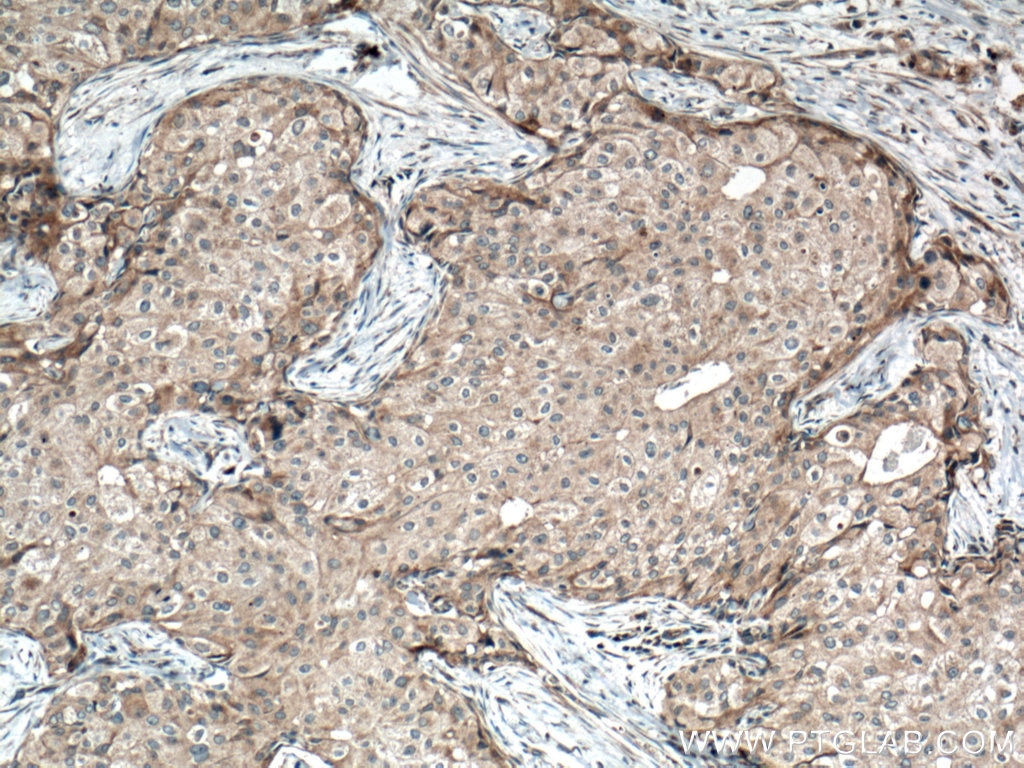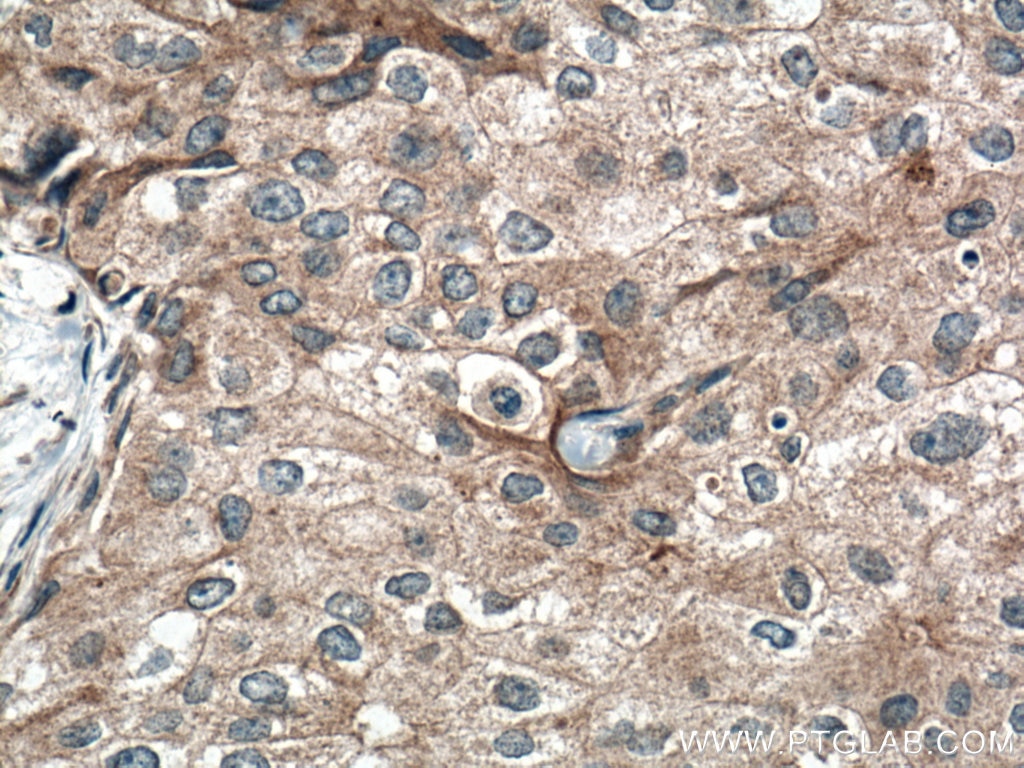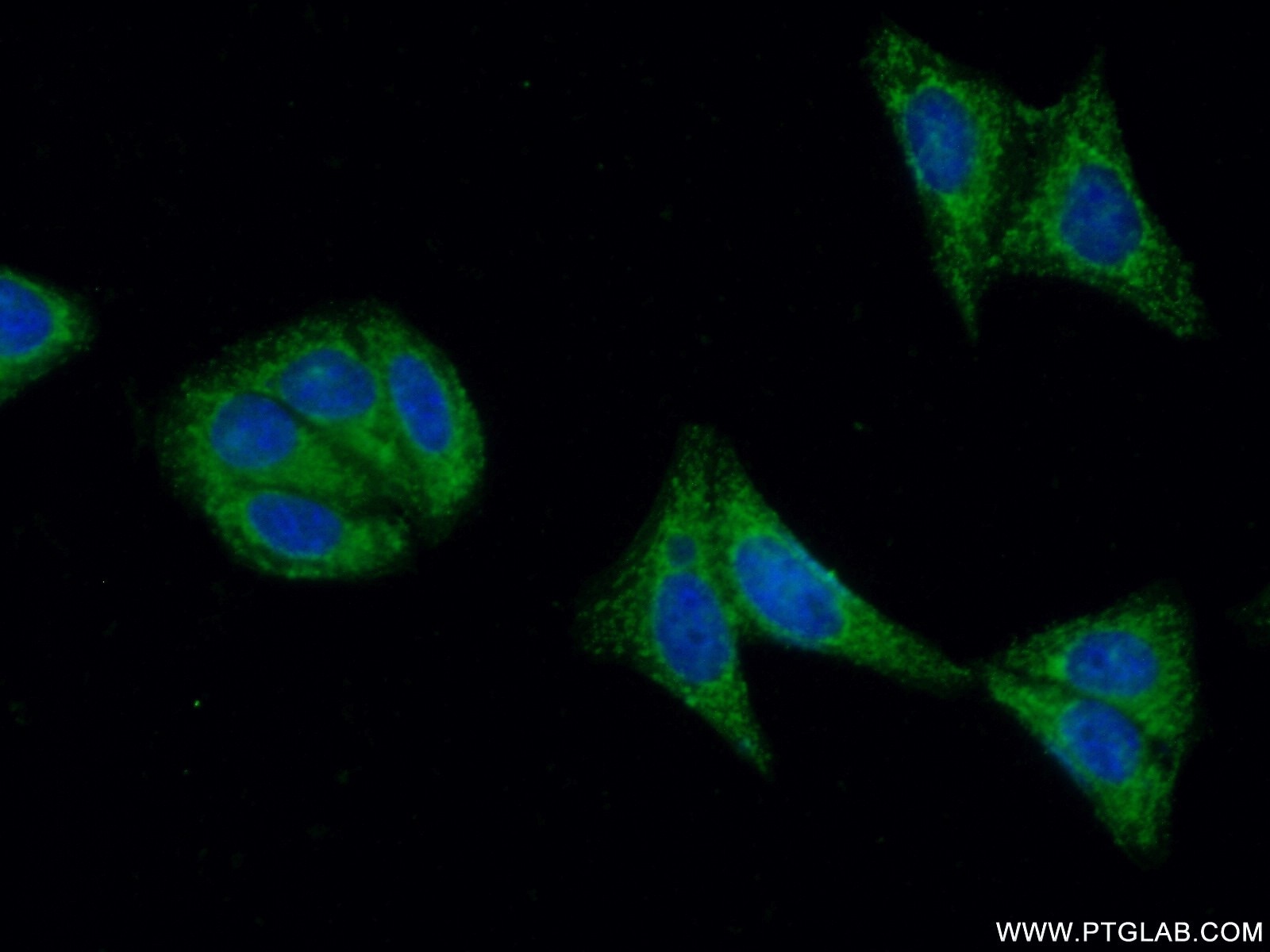- Phare
- Validé par KD/KO
Anticorps Polyclonal de lapin anti-FGFR4
FGFR4 Polyclonal Antibody for WB, IHC, IF/ICC, ELISA
Hôte / Isotype
Lapin / IgG
Réactivité testée
Humain et plus (1)
Applications
WB, IHC, IF/ICC, ELISA
Conjugaison
Non conjugué
N° de cat : 11098-1-AP
Synonymes
Galerie de données de validation
Applications testées
| Résultats positifs en WB | cellules L02, |
| Résultats positifs en IHC | tissu de cancer du sein humain, il est suggéré de démasquer l'antigène avec un tampon de TE buffer pH 9.0; (*) À défaut, 'le démasquage de l'antigène peut être 'effectué avec un tampon citrate pH 6,0. |
| Résultats positifs en IF/ICC | cellules HepG2 |
Dilution recommandée
| Application | Dilution |
|---|---|
| Western Blot (WB) | WB : 1:500-1:2000 |
| Immunohistochimie (IHC) | IHC : 1:50-1:500 |
| Immunofluorescence (IF)/ICC | IF/ICC : 1:50-1:500 |
| It is recommended that this reagent should be titrated in each testing system to obtain optimal results. | |
| Sample-dependent, check data in validation data gallery | |
Applications publiées
| KD/KO | See 2 publications below |
| WB | See 11 publications below |
| IHC | See 4 publications below |
| IF | See 7 publications below |
Informations sur le produit
11098-1-AP cible FGFR4 dans les applications de WB, IHC, IF/ICC, ELISA et montre une réactivité avec des échantillons Humain
| Réactivité | Humain |
| Réactivité citée | Humain, souris |
| Hôte / Isotype | Lapin / IgG |
| Clonalité | Polyclonal |
| Type | Anticorps |
| Immunogène | FGFR4 Protéine recombinante Ag1573 |
| Nom complet | fibroblast growth factor receptor 4 |
| Masse moléculaire calculée | 88 kDa |
| Poids moléculaire observé | 95, 100-110 kDa |
| Numéro d’acquisition GenBank | BC011847 |
| Symbole du gène | FGFR4 |
| Identification du gène (NCBI) | 2264 |
| Conjugaison | Non conjugué |
| Forme | Liquide |
| Méthode de purification | Purification par affinité contre l'antigène |
| Tampon de stockage | PBS with 0.02% sodium azide and 50% glycerol |
| Conditions de stockage | Stocker à -20°C. Stable pendant un an après l'expédition. L'aliquotage n'est pas nécessaire pour le stockage à -20oC Les 20ul contiennent 0,1% de BSA. |
Informations générales
Fibroblast growth factor receptor 4 (FGFR4) is a member of a highly conserved tyrosine kinase family, along with FGFR1-3. This family consists of an intracellular tyrosine kinase domain, a single transmembrane domain, and extracellular ligand-binding domains (PMID: 32492514). FGFR4 is the predominant FGFR isoform present in human hepatocytes. FGFR4 has been proposed to play a role in the observed induction of hepatocyte proliferation and carcinogenesis by FGF19; however, contradicting evidence proposing a protective role for FGFR4 in suppressing hepatoma progression has also been proposed(PMID: 20018895). While the role of FGFR4 in cancer remains to be fully elucidated, several findings suggest that this receptor may be an important player in Hepatocellular carcinoma (HCC) development and/or progression(PMID: 10336501).
Protocole
| Product Specific Protocols | |
|---|---|
| WB protocol for FGFR4 antibody 11098-1-AP | Download protocol |
| IHC protocol for FGFR4 antibody 11098-1-AP | Download protocol |
| IF protocol for FGFR4 antibody 11098-1-AP | Download protocol |
| Standard Protocols | |
|---|---|
| Click here to view our Standard Protocols |
Publications
| Species | Application | Title |
|---|---|---|
J Med Chem FGF19-Based Mini Probe Targeting FGFR4 for Diagnosis and Surgical Navigation of Hepatocellular Carcinoma
| ||
Biochem Pharmacol Association between the perturbation of bile acid homeostasis and valproic acid-induced hepatotoxicity. | ||
Biomed Pharmacother Bupleuri radix extract ameliorates impaired lipid metabolism in high-fat diet-induced obese mice via gut microbia-mediated regulation of FGF21 signaling pathway. | ||
J Cell Biochem Glycosylation of FGFR4 in cholangiocarcinoma regulates receptor processing and cancer signaling. | ||
Int J Oncol Role of fibroblast growth factor 4 in the growth and metastasis of colorectal cancer. | ||
Cancer Res Treat FGFR4 Gly388Arg Polymorphism Affects the Progression of Gastric Cancer by Activating STAT3 Pathway to Induce Epithelial to Mesenchymal Transition. |
Avis
The reviews below have been submitted by verified Proteintech customers who received an incentive for providing their feedback.
FH Jillian (Verified Customer) (05-27-2025) | Overall we weren't as happy with the antibody as we wanted to be. There appeared to be a lot of nonspecific binding in the NHP samples that we tested it on
|





